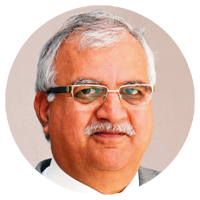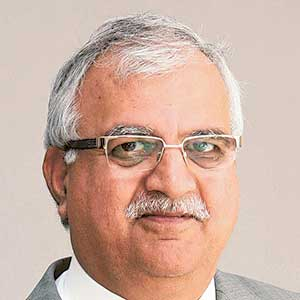Dubai: Indian schools in the UAE and Gulf countries lobbied hard to prevent a retake of two CBSE exams after the papers were leaked in India, Gulf News can reveal.
Last week, India’s CBSE (Central Board of Secondary Education) had said all students would have to reappear for the Class 10 maths and Class 12 economics exam after it emerged that exam papers had been leaked on WhatsApp.
On Friday, the CBSE said students outside India would not have to retake the exams. According to an educationist in Dubai, the decision follows intense lobbying by schools in the UAE and the Gulf to the CBSE.
- Dr Ashok Kumar | CEO of Indian High School
In an interview with Gulf News on Saturday, Dr Ashok Kumar, CEO of Indian High School (IHS) in Dubai, outlined how he coordinated a massive campaign to convince authorities in India to exempt students in the UAE and Gulf countries from retaking the exams.
Dr Kumar is the superintendent of the CBSE exam centre at IHS and a coordinator of seven “hubs” in the Gulf that, in turn, coordinate with other exam centres in the region. There are 20 CBSE exam centres in the UAE alone, he said.
Dr Kumar said the efforts centred around assuring officials in India that there was no need for an exam retake in the UAE and the Gulf as papers here had not been compromised.
With no time to spare, scores of school representatives signed, scanned and emailed “certificates” showing all the CBSE question papers received were fully accounted for, he added. Dr Kumar led WhatsApp groups coordinating the efforts between schools here and aboard, and relaying their assurances to officials in India.
He also pointed out that the custody and handling of the exam papers had taken place under CCTV, which also ensured the papers had not been leaked in the UAE.
Had it not been for close coordination and lobbying, thousands of students in the UAE and the Gulf may have had to “needlessly” retake the exams, he said. In the UAE, around nearly 8,400 students appeared for the Class 10 exam and some 2,700 students appeared for Class 12 paper. The last of the subject papers will be held by mid April.
Worldwide, including in India, 2.7 million students are taking the high-school exams this year.
“When news of the leak in India broke, students and parents were naturally stressed. Besides the concern that students would have to retake the exams, there were other considerations,” Dr Kumar said.
He explained that, for instance, many parents typically cancel the UAE residence visa of their children as they prepare to move to India where they will be taking university entrance exams after the CBSE. Retaking the CBSE exams could have meant retaking their college admission exams too.
There had also been the question of refresher or revision classes at schools ahead of the exam retakes.
“Being overseas, outside India, all these challenges were there. We began with understanding these problems and talking to the CBSE in India about this. We started sending these reports of assurances that no paper was leaked in our schools and the CBSE was satisfied, based on our reports. Officials in India took the decision to not hold the same exams again here. It was a big relief, of course.”














